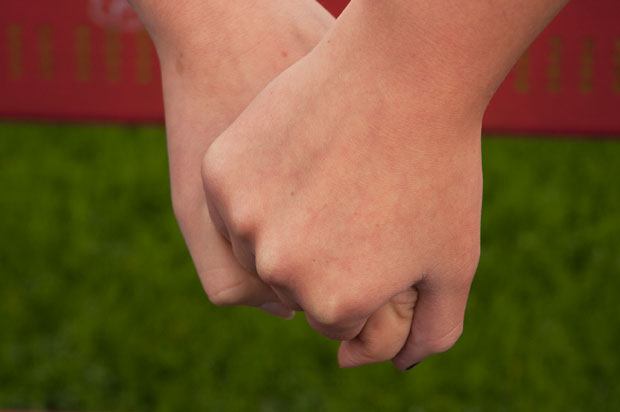Their self-harm is too much for me
How do you know when to call in professional help for a friend or loved one? If you've tried talking to them, but they won't listen - what should you do? The Mix is here to make sure you know what to do if things get serious.

I think they’re self-harming, what should I do?
It’s hard supporting a person who is unwilling or feels unable to accept help. Self-harming can take many forms, such as cutting or head banging, but it could also be taking too many pills or alcohol abuse. If you know a friend is self-harming but they’re not willing to talk about it, helping them to understand you’re there for them is really important.
“People have these ideas that self-harming is a cry for help or trying to get attention. It wasn’t for me,” says Greg, 21. “I wanted people to understand that I was hurting. I wasn’t ready to be helped but I wanted people to know. I think if people had listened a bit earlier I would’ve got some help sooner.”
If you think your friend or loved one is hurting themselves you may want to confide in somebody that you trust, such as a family member or teacher. You can still seek advice without mentioning their name.
What do I do if they tell me they self-harm?
Be clear and honest about your feelings. Don’t promise not to tell anyone else; you may feel that your friend is in danger and needs professional help. Try to remember to take them seriously and respect their feelings. It may be hard to know how to react in the heat of the moment, especially if you’re worried that their self-harming may have got out of control, but try to avoid:
- Teasing them or calling them ‘mad’.
- Blaming them for hurting themselves.
- Being critical – even if you feel shocked by what they have done or are saying. This may make them feel even more alone and prevent them talking to anyone else.
- Making them promise never to self-harm again. They may well do it again and then feel guilty about breaking their promises.
What should I do if they refuse help?
Refusing to acknowledge that there is any kind of problem can be a common response. Someone who self-harms may also be anxious about approaching services for help because of the stigma. You can’t force somebody to talk or seek help if they don’t want to, but you can encourage them to get help and let them know that you’re there for them.
In exceptional circumstances you may need to act without your friend’s consent. “If we feel a young person is emotionally distressed and may seriously harm themselves, we will always call the doctor (GP) first,” says Caryl Stock, who works on The Amber Project, a self-harm project in Cardiff. “The GP can offer support, open the doors to other services and, if appropriate, refer them on for a psychiatric assessment.”
They rely on me too much
It’s 1am and your mobile phone is ringing – the calls have been more frequent and they’re always at the same time of day. You want to help and let them get things off their chest, but it’s getting to the point when you can’t deal with it on your own. On the other hand, you may feel worried that if you don’t answer that call that they will do something to hurt themselves, and they may even be threatening to do so. What should you do?
- If you don’t feel able to talk to them it’s best to be honest about this, both with them and yourself. It’s OK to say something like: “I’m sorry that you’re feeling upset, but I can’t talk to you about this right now.” Remind them that there are 24-hour support services available such as the Samaritans, and keep the numbers to hand so that you can pass them on.
- Accept the fact that you can’t always be there for them when they’re distressed and feel the need to self-harm, and find someone you can talk to openly so that you have support as well.
- If your friend has told you they’ve taken an overdose or hurt themselves badly, even if you’re not sure how serious it is, call 999 for some advice. NHS 111 (England), NHS Direct Wales (Wales) or NHS 24 (Scotland) will also offer you advice, but if you don’t want to risk any further delays it may be better to call 999 immediately.
If your friend is admitted to hospital
It may be that your friend has no choice in seeking mental health support and they’ve been admitted to hospital for their own safety. Sending regular cards and notes is useful, as your friend may feel isolated.
They’ll probably welcome a visit – you can always go with someone else if you’re nervous about this. If your friend is considered to be at risk, the hospital may insist that there is a member of staff present for visits. This can feel uncomfortable, but it’s common practice.
Next Steps
- Under 19? You can get confidential help with self-harm from ChildLine – either over the phone or through an online chat.
- Anyone can contact the Samaritans on their 24-hour helpline to talk things through. 116 123
- Chat about this subject on our Discussion Boards.
By Liz Scarff
Updated on 29-Sep-2015
Sorry, comments closed
No featured article







